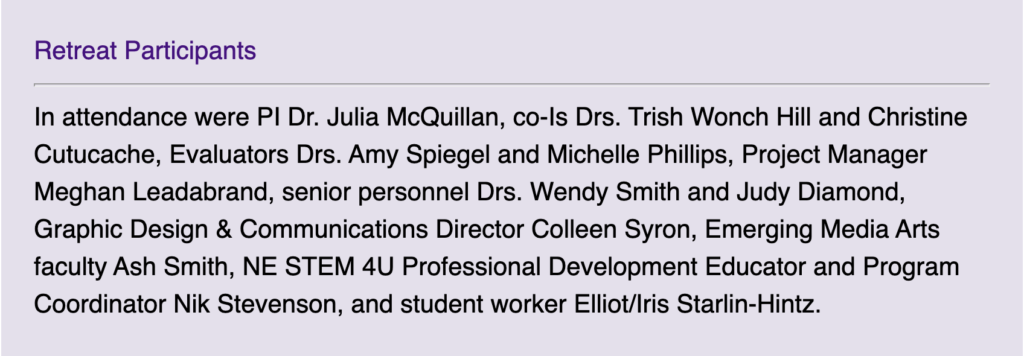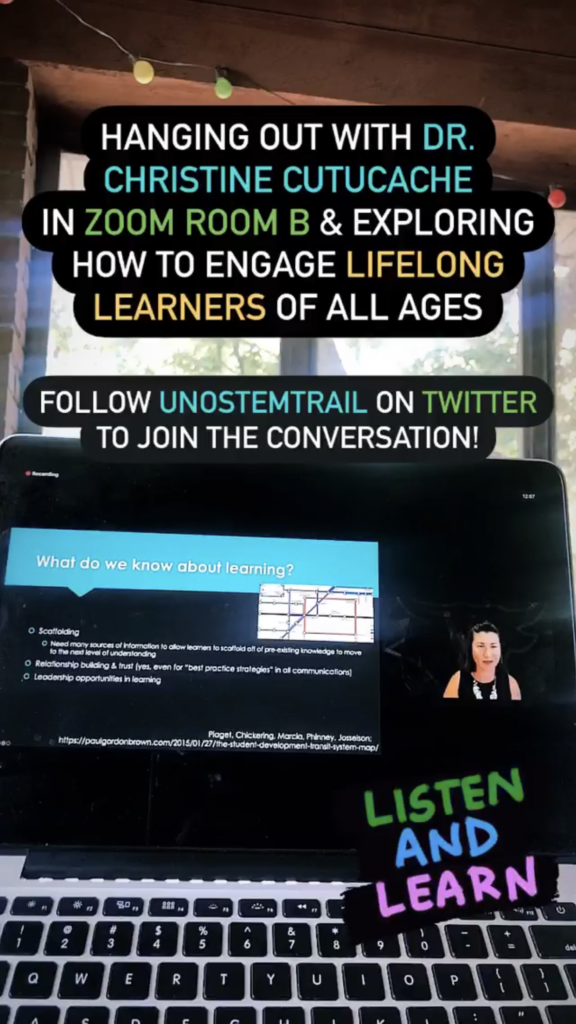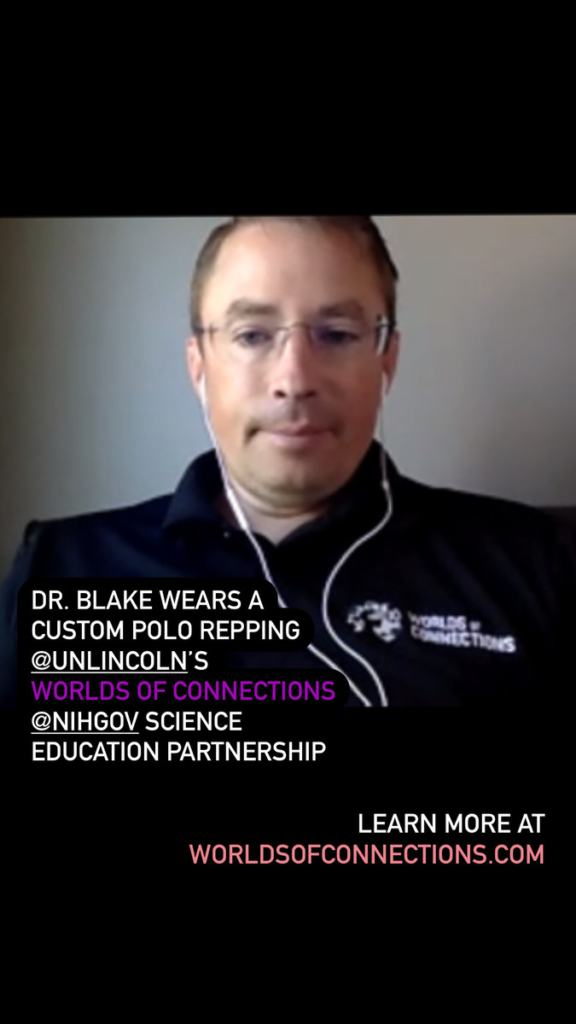Worlds of Connections Newsletter
Volume III, Issue 1
18 December 2020
Letter from Dr. McQuillan
Dear Worlds of Connections community,
We are halfway through our five-year funding from NIH. We knew that time would fly and that we had ambitious goals. I did not anticipate the pandemic. Somehow, we are just as busy (maybe busier?) during the pandemic as before.
The biggest pandemic-related changes involve the NE STEM 4U after-school clubs. The Omaha NE STEM 4U team continues to provide programming by being flexible and doing some things remotely. They create packets with the materials youth will need for the eight-week club sessions and can use to complete activities in their homes or schools. The Omaha team has modified the delivery of activities to work in this new environment. Continuing the clubs in Lincoln this year was not possible; therefore, we focused on refining network science activity plans.
Even with the pandemic, we are mostly on track with our plan to take what are learning from developing, piloting, and refining activities in the NE STEM 4U after-school clubs and use these insights to develop deliverables for broader dissemination (for example, emerging media arts [EMA] deliverables). We have learned a great deal in the process, including the need to include some basic ideas about complex systems.
Pandemics are fundamentally network phenomena. It is uncertain, however, to what extent members of the public realize the relevance of network science for their experience of living through a pandemic. We therefore collaborated on two projects to measure youth and adult understanding of network concepts relevant to responding to the pandemic. First, we collaborated with Dr. Judy Diamond on her NSF-funded RAPID grant to develop a survey to measure youth knowledge of pertinent network science concepts, as well as the effectiveness of the C’rona Comix for increasing youth curiosity about COVID-19. Second, we worked with advisory board member Dr. Robin Gauthier to survey Nebraskans through the “NebrASKa Voices” panel project. We are just digging into this data and will have parallel information on youth and adult knowledge of network science and pandemics.
As planned in our proposal, Ash Smith is exploring options for our EMA deliverable. We are also exploring ways to capture stories of network scientists, so that youth can imagine what careers in network science would be like and if they are for them.
You will learn more about these activities in the following pages. Thank you for your support.
Project Accomplishments
This month, the Worlds of Connections team gathered (via Zoom) for the WoC SEPA Fall 2020 Retreat. We met for two hours a day on three days. Some team members finally got a chance to meet and visit. As a group, we reviewed our plans and goals, plus gave updates on research, evaluation, deliverables, and education plans. We reflected on how best to meet our overall objectives and decided to make some changes about where we put our energies in the short run. In addition to planning for the future, we used the Retreat as an opportunity to reflect on the various areas of the project, including Network Science Activities & Deliverable Development, Outreach, Research & Evaluation, and Conferences & Presentations, which you can read about below. Our evaluators will provide a summary of the Retreat in the coming months.

Network Science Activities and Deliverable Development
Since we suspended our Lincoln chapter of NE STEM 4U after-school clubs in mid-March, Dr. Wendy Smith has helped lead efforts to refine the afterschool network science activity plans to include more information that would support the implementation of the activities. We are exploring new ways to get formative feedback on activities given the constraints of the pandemic. As described in our grant proposal, we are building on our knowledge of youth responses to the activities to conceptualize stories for the EMA deliverable. Ash Smith, assistant professor in the Johnny Carson Center for Emerging Media Arts, is leading weekly conversations with PI Dr. McQuillan, Evaluator Dr. Spiegel, Project Coordinator Meghan, and experts as relevant as we develop story-driven EMA deliverables. We are also exploring partnerships with Professor Smith’s university-funded Environmental Futures Platform project.
In September 2020, we welcomed Elliot/Iris Starlin-Hintz back to the project team. Elliot/Iris assisted with the 2019 Network Science Institute for Teachers by recording video footage of network science presentations and facilitating run-throughs of network science activities. Now he is editing the videos to help us describe careers using network science.
Outreach
In July, PI Dr. McQuillan and Co-I Dr. Wonch Hill taught “Network Science: Insights for Pandemics” as part of a University of Nebraska–Lincoln collaborative course, “The COVID-19 Pandemic: Effects on Industries, People and Society.” In their module, Drs. McQuillan and Hill explained how network models and simulations can help us mitigate the spread of COVID-19 and shared some of our favorite online network science resources with students—including a visualization of social distancing networks in the era of COVID-19, videos about foreseeing pandemics and predicting and modeling epidemics, a puzzle game about epidemic prevention, and playable simulations of COVID-19 futures.
On August 7, the WoC team, led by Dr. Judy Diamond, assisted Lincoln Public Schools (LPS) Science Curriculum Specialist Betsy Barent with the LPS Annual Compulsory Professional Development (CPD). The CPD day typically includes an in-person, interactive Science Connector that we had to forego this year because of the pandemic. Instead, we held the event in the new normal way—via Zoom. The day focused on topics that science teachers were particularly interested in, the COVID-19 pandemic and racial equity in education. After welcoming remarks from Ms. Barent, Dr. McQuillan briefly discussed the recent WoC survey of LPS teacher advice networks. Drs. Peter Angeletti and Bob Rauner presented on COVID-19 and teaching during a pandemic, and Dr. Amanda Morales presented on equity in the classroom. We were fortunate to have thoughtful, engaging speakers who, according to teacher feedback, were the highlight of the event.
Research & Evaluation
Co-I Dr. Wonch Hill led a team of WoC researchers in the collection of the second annual wave of LPS teacher network data through a brief, online survey over the summer of 2020, and PI Dr. McQuillan discussed these data with teachers at the LPS CPD day. Dr. Spiegel evaluated the CPD event and created a brief summary report, which revealed a positive response from the teachers in attendance. The speakers were particularly well received by attendees: “I was nervous before [the CPD day],” wrote one LPS teacher, “but now I feel better about how to teach my students about how COVID works, and the equity presentation gave me some specific ideas of things I can do in my classroom.” Overall, teachers were happy with the format of the event, the use of time, and insights from speakers.
WoC team members continue to collaborate on the NSF Rapid Response project (PI Dr. Diamond) Using Popular Media to Educate Youth About the Biology of Viruses and the Current COVID-19 Pandemic. The focus of the project is developing and researching richly illustrated science narratives, the C’rona Comix, designed to engage middle school youth, educators, and librarians in learning about viruses in relation to COVID-19. We encourage you to read and share the free versions of the C’rona Comix on the World of Viruses: COVID-19 website. A forthcoming book of all C’rona Comix will include a chapter on network science for pandemics written by WoC team members.
With WoC Advisory Board member Dr. Robin Gauthier, we asked about COVID-19 and knowledge of network science via a survey of Nebraskans who had completed a prior Nebraska Annual Social Indicators Survey (2018, 2019 winter or summer, or 2020) through the “NebrASKa Voices” panel project. We were excited that 504 people (out of 699) completed the mail survey. We are currently analyzing the data and hope to submit a research article in early Spring 2021.
Since our last newsletter, we welcomed Dr. Joseph Jochman as a post-doctoral researcher who is co-authoring research publications with team members. Sociology graduate students Grace Kelly and Nestor Hernandez (NE STEM 4U Mentor Emeritus) are continuing their summer research projects part-time during the academic year. Miranda Melson, who served on the WoC research team as a Sociology undergraduate, has now graduated and is pursuing a PhD in Sociology at Northeastern University.
Conferences & Presentations
Although conferences in 2020 look different from those in years past, the WoC team attended virtual conferences this past summer and fall. Several WoC team members participated in UNL SciComm, a conference on effective science communication, from August 14–16. Project Coordinator Meghan served on the conference planning committee, and as part of the social media subcommittee, ran the SciComm Instagram account throughout the conference. Co-I Dr. Cutucache was a featured speaker and presented a talk on engaging lifelong learners, entitled “Data-driven Decision Making for SciComm to All Ages: How Do We Know if We’re Speaking Clearly and if They’re Hearing Us?”. Advisory Board member Dr. James Blake also spoke at the conference, providing a “year in review” of the Lincoln STEM Ecosystem and its benefits to schools, after-school programming, informal science centers, and others in the Lincoln community.
- Snapshot from UNL SciComm on Instagram: Dr. Christine Cutucache (left) explores how to engage learners.
- Snapshot from UNL SciComm on Instagram: Dr. James Blake presents on the Lincoln STEM Ecosystem
The week of November 9–13 was packed with two simultaneous online events: NIH SciEd 2020 and the 2020 Symposium on Substance Use Research. NIH SciEd, the annual conference for NIH Science Education Partnership Award projects (SEPAs), usually takes place in Washington, D.C. each spring. This year, the SEPA meeting took the form of a virtual mini conference, and WoC team members participated in open discussion sessions on Informal Science Education, Research & Evaluation, Teacher Professional Development, and Programs for Students. We also attended the annual SEPA town hall hosted by Program Officer Tony Beck and had the chance to meet and collaborate with team members from SEPA projects across the country. WoC Co-I Dr. Cutucache also served on the planning committee for NIH SciEd. The 2020 Symposium on Substance Use Research was hosted in part by a WoC partner, the Rural Drug Addiction Research (RDAR) COBRE. By attending the symposium, WoC team members learned about drug use and social networks, as well as how network science can be used for drug use interventions. WoC Advisory Board members Drs. Robin Gauthier and Jeffrey Smith hosted an informal “bring your own coffee” connector on Social Networks and Inequality.
Thank you all again for your involvement and support! Please do not hesitate to contact us with updates, suggestions, questions or comments.
We look forward to seeing you next year!
Best regards,
Julia McQuillan
Worlds of Connections Primary Investigator
Professor of Sociology, University of Nebraska-Lincoln
Upcoming Dates
8–11 February 2021 | This year, the American Association for the Advancement of Science (AAAS) Annual Meeting: Understanding Dynamic Ecosystems is relevant to network science; therefore, consider participating in the online conference.
18 February 2021 | Dr. McQuillan will present “Worlds of Connections: Can Network Science for Health Attract New Youth to Health Careers?” for the Discipline-Based Education Research (DBER) group STEM Education Seminar series.
19 February 2021 | Lauren Ancel Meyers, Director of The University of Texas COVID-19 Modeling Consortium, will present a talk on networks for health hosted by Worlds of Connections and the UNL Department of Sociology.
Summer 2021 | Through the Center for Science, Mathematics, and Computer Education, Drs. Wendy Smith & Julia McQuillan plan to teach a graduate course for middle- and high-school math and science teachers on the Next Generation Science Standards crosscutting concept 4: systems and system models. (Details coming soon!)
Date TBD | NIH SciEd 2021, the annual conference for NIH SEPAs, will take place in Spring or Fall 2021. (Check the SciEd website for forthcoming details.)


